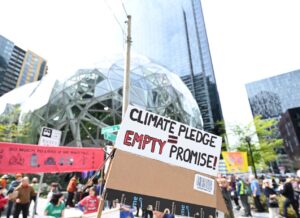by Robert Kaminski
Sitting in the Pacific Building in the morning on March 9th, I learned an important lesson: high-powered decision-making is incredibly dreary. The halls of power (at least in Seattle) are lined with drywall and floored with shabby office carpet. Windowless conference rooms are stocked with the same drab plastic tables you would find in any corporate office. This seemed intentional—and a bit ironic, given that the people in this room could have a serious impact on climate change.
I was attending the monthly Seattle City Employees Retirement System (SCERS) board’s monthly meeting to speak on behalf of Seattle Divest, a campaign spearheaded by city employees and 350 Seattle to divest the city pension fund from fossil fuels.
Ten of us took turns giving testimony on the issue. We spoke on behalf of leaders such as Matt Remle, the local community organizer and Standing Rock tribal member who helped lead the Wells Fargo and #NoDAPL campaigns. We pointed to the physical reality of climate change. We quoted experts on climate change and the fossil fuel economy. Most importantly, we pointed to international commitments under the 2015 United Nations Paris Agreement, which nominally commits the world’s governments to ambitious climate action.
Our analysis seemed airtight. Based on the city’s published strategy, the roughly two-billion-dollar pension fund holds at least $150 million in fossil fuel stocks; since 2014, when the City Council encouraged SCERS to divest these holdings, SCERS has lost out on over $50 million dollars due to poor performance of fossil fuels. The moral reality and financial reality hum in tune, this time.
Yet SCERS board’s chief investment officer Jason Malinowski had some things to say. From page 13 of the meeting report:
“Jason Malinowski attended the Council of Institutional Investors conference in Washington, DC from February 27-March 1, 2017. … Key takeaways were that: (1) Trump’s election may lead to the United States withdrawing from the 2015 Paris Agreement on global climate change reduction and makes further global multi-lateral agreements on climate change unlikely. … (4) reduced regulation is likely in the US energy industry.”
He went on to recommend that for those reasons, the city should not divest from fossil fuels.
I was floored. The City’s chief investment officer was arguing that Seattle should disregard the urgency of climate change and work against international consensus in order to profit from Trump’s predatory politics. He was effectively saying, if there are going to be human rights abuses and destruction of our planet’s life, let’s make sure to profit from it.
Yet later in the meeting, in an Orwellian feint, Jason spoke proudly of the city reprimanding BlackRock Funds (his former employer and noted climate hypocrite) for its failure to vote in favor of an ExxonMobil shareholder resolution to force Exxon to disclose the climate risk of its assets–BlackRock, which just voted with the Rex Tillersons (or Wayne Trackers) of this world, manages $350 million of Seattle pension money. BlackRock is also ExxonMobil’s largest shareholder.
I was shocked as I left the conference room and went downstairs. The board members had seemed concerned about the financial, moral, and political developments we raised. I can only hope they will be thinking about this more.
In the meantime, we must continue to build public pressure on SCERS. One of capitalism’s main tenets is the exploitation of politics for profit—and it seems that there are many who will continue to tell the SCERS to put profits over all else, even as we march into catastrophe.








